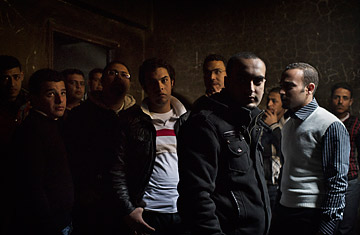
Khaled Kamel, foreground in black, and friends, in Damanhour, Egypt.
If you needed to, you could squeeze Khaled Kamel's life into a six-foot square box, his mother says. "This is basically Khaled's life," says Amal Abdel Maguid, pointing to a narrow twin-size bed crammed into a corner next to a desk with a hulking HP desktop computer on it.
And for a 20-year-old university student with a penchant for Facebook and computer games, that might not seem so extraordinary. But from this desk in the tiny, concrete, Soviet-style apartment that he shares with his mother, grandmother, and two younger siblings in the Nile Delta village of Zowiya Ghazal, Kamel also helped launch one of the most momentous events in modern Middle East history: the revolution that toppled the 30-year-old dictatorship of President Hosni Mubarak.
Kamel represents that newly vocal sector of the Egyptian population that opposition parties have long referred to as the silent majority — but is now widely known as the Facebook generation. There are millions of them; middle and lower class Egyptians — many under 35 — who have long complained of regime corruption, unemployment, and police brutality, but who, without ties to any political party or local leadership, were never motivated to take to the streets. "We were all regular young people," Kamel says. "It was never about politics."
More often, it was about anxiety over jobs and marriage, and a burning animosity toward a central authority and its foot soldiers that Kamel says treated him and others like creatures they could kick around and squash. "The police treated us like we were a different kind of humans," he says. He remembers falling off a train once, only to get assaulted by a police officer. "Instead of helping me, he hit me because I was lying there on the platform, which you're not supposed to do."
For a couple of years, Kamel blogged about his frustrations. "It was a sarcastic blog," he says, because humor is an important way the Egyptians have learned to cope with the hardship in their lives. "I wrote about anything that I felt was wrong." Kamel's mother thought he was wasting his time. "I didn't want him sitting at the computer so much," she says. "I wanted him to study, get a diploma, get a job, and not get involved in politics."
But then, all of Kamel's frustrations — and suddenly, his raison d'être — came into sharp relief one day with the news of another man named Khaled. "I was shocked by the picture of Khaled Said's face," he says. "I needed to do something about it." Said, a businessman, was eight years older than Kamel when he was beaten to death on an Alexandria street by plainclothes cops in June of last year. He was just another young computer nerd like Kamel. But his death — and the gruesome picture of his smashed face that circulated on the internet soon after — attracted more than 100,000 people to join a facebook page that would later help send thousands into the streets on Jan. 25, 2011.
Back in June, the page's then-anonymous administrator, Middle East Google executive Wael Ghonim, came up with the idea of organizing Said's large Facebook following in order to stage a series of silent, black-clad vigils. Kamel took a train half-an-hour north to Alexandria with a small, new Kodak camera. He filmed the first vigil and posted it on Facebook. Ghonim noticed, and soon, they were chatting regularly over gmail, talking strategy and planning for the months ahead.
Last week, shortly after Kamel learned Ghonim's identity for the first time, the two joined other activists on the popular Egyptian talk show "10'o'clock at Night" to talk about how they — a bunch of unknowns — had helped launch a revolution.It was a startling success for a silent majority that, Kamel insists, cares little about Egypt's traditional political groups like the Muslim Brotherhood or the liberal Wafd party. "I don't care who ends up running this country, as long as I have the ability to change them if I don't like them," he says. "We just wanted to make the country ours. Our country — meaning we're not going to wait for someone else to fix it."
Outrage over Said's death had set the ball in motion, but it was the Tunisian revolution in January that confirmed that Kamel and Ghonim and others could make it a serious game. "There were a lot of people ready to do it," Kamel says of his and other youth activists' planning in the lead-up to the Jan. 25 protests, "But when they saw that the revolution in Tunisia succeeded, they realized that it was possible."
